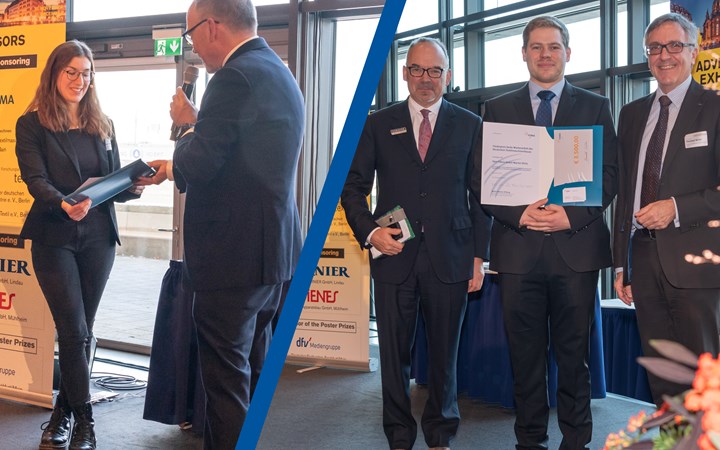ITA student research progresses ultra-thin composites, textile sorting
Novel method for fiber-to-fiber recycling of used textiles and a low-cost, cost-effective precursor for carbon fiber manufacture earn 2023 Walter Reiners Foundation Awards.
Annika Datko and Peter D. Dornier (left) and Dornier, Flávio André Marter Diniz and Professor Dr. Thomas Gries. Photo Credit: ITM/TU Dresden
Two graduate students from the Institut für Textiltechnik (ITA) of RWTH Aachen University (Germany), Flávio André Marter Diniz and Annika Datko, have received Walter Reiners Foundation Awards for their work in fiber-reinforced composites, specifically progress in ultra-thin carbon fiber and optimization in sorting used textile fibers using near-infrared (NIR) sensor technology, respectively.
In his Master’s thesis, Marter Diniz developed polyethylene (PE)-based carbon fibers that are said to be two to three times thinner than usual and showed how the use of PE-based precursors can reduce the price of carbon fiber by 50% in the future. In addition, Marter Diniz reports that the resulting carbon fiber showed excellent surface quality without any noticeable structural deficits. He was also able to reduce the time-consuming sulphonation process by 25%. For his thesis “Investigation of the stabilization and carbonization process for the production of ultra-thin polyethylene-based carbon fibers,” he was awarded the prize for the best diploma/Master’s thesis in German textile mechanical engineering.
In her Bachelor’s thesis, Datko showed how used textiles can be sorted by fiber composition using NIR sensors and, on a laboratory scale, has an average mean error of only 4%. Sorting according to fiber composition to subsequently carry out fiber-to-fiber recycling is the most sustainable way to produce new fibers for new products from (used) textile fibers, according to the research, though they are currently sorted out almost exclusively by hand. This manual process — sorting out by feel — is made more difficult with used fibers or fiber blends.
NIR sensor technology is already state-of-the-art for recycling plastic waste, but is still in its infancy when it comes to sorting textiles. Using Datko’s approach, the textile sample is irradiated with NIR light. Based on the wavelengths of the reflected light and the light picked up by the detector, a material-specific spectrum is created that resembles a fingerprint. In her Bachelor’s thesis, Datko compares these spectra or fingerprints of textiles with different fiber components. She was able to prove that it is possible to differentiate between different fiber compositions using NIR.
For her work, “Experimental analysis of the sortability of used textiles containing polyester using near-infrared spectroscopy on a laboratory and industrial scale,” Datko received a prize and award for the best Bachelor’s thesis from the German Textile Machinery Association.
“This method shows the way to sustainably tackle the mountains of used textiles,” Professor Dr. Thomas Gries, director of ITA, says. “We are proud that two of our students have been honored with the prestigious Walter Reiners Prize. Every award underlines the quality of our education. Congratulations to our two winners this year!”
The VDMA Textile Machinery Association is actively involved in supporting young engineers through its Walter Reiners Foundation. Every year, the Foundation of German Textile Machinery Manufacturers awards sponsorship and sustainability prizes in the Bachelor, Diploma and Master categories. Academic work in which solutions for resource-saving products and technologies are developed is eligible for the sustainability prizes.
Related Content
-
Plant tour: Albany Engineered Composites, Rochester, N.H., U.S.
Efficient, high-quality, well-controlled composites manufacturing at volume is the mantra for this 3D weaving specialist.
-
Sulapac introduces Sulapac Flow 1.7 to replace PLA, ABS and PP in FDM, FGF
Available as filament and granules for extrusion, new wood composite matches properties yet is compostable, eliminates microplastics and reduces carbon footprint.
-
Infinite Composites: Type V tanks for space, hydrogen, automotive and more
After a decade of proving its linerless, weight-saving composite tanks with NASA and more than 30 aerospace companies, this CryoSphere pioneer is scaling for growth in commercial space and sustainable transportation on Earth.
















